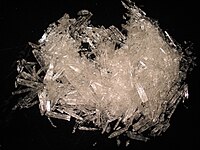
Photo from wikipedia
Background: Thirst is a very common symptom in fasted children in intensive care unit (ICU). This study aimed to evaluate the effect of sterile ice water versus menthol spray in… Click to show full abstract
Background: Thirst is a very common symptom in fasted children in intensive care unit (ICU). This study aimed to evaluate the effect of sterile ice water versus menthol spray in ICU fasted children, to provide insights to the clinical care of fasted children. Methods: The children admitted to the ICU of our hospital from June 1, 2021 to August 31, 2022 and needed to fast were included. Children were randomly assigned to the ice water group or menthol group. We evaluated and compared the thirst distress scale (TDS), oral mucosa wetness scale (OMWS), children medical fear scale (CMFS), numerical rating scale (NRS), unstimulated whole saliva (UWS) flow rate between 2 groups. Results: A total of 139 children were included, involving 69 children in ice water group and 70 children in menthol group. There were no significant differences in the baseline characteristics, TDS, OMWS, OMWS, CMFS, and NRS score, UWS flow rate before intervention between ice water group and menthol group (all P > .05). After intervention, the TDS, OMWS, NRS score of menthol group was statistically less than that of ice water group (all P < .05), the UWS flow rate of menthol group was statistically higher than that of ice water group (P = .034). Conclusions: Compared with ice water spray, menthol spray may be more beneficial to relieve the thirst and increase the comfort in ICU fasted children. Future studies with larger sample size and rigorous design are needed to evaluate the effects and safety of ice water and menthol spray in the nursing care of children.
Journal Title: Medicine
Year Published: 2023
Link to full text (if available)
Share on Social Media: Sign Up to like & get
recommendations!